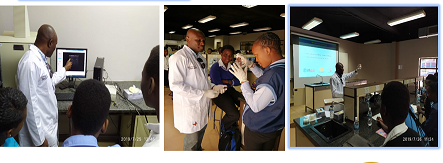Germs are everywhere
Welcome to the conversation
Germs are everywhere, and we are in contact with them all the time. Microbes are on our skins and inside us. They are in our environments, in our drink, and in our food. Microbes that do harm to us are called germs. The purpose of this forum, is to engage as a community, to mobilize ourselves, for a participatory understanding and co-ownership of knowledge on germs; and how together we can prevent and control them, and manage their effects, in our communities. Many times, we talk about germs only when someone is ill, or when there is an outbreak of disease in our local community, or when the outbreak is worldwide, for example, the Covid-19 pandemic. We rarely talked about germs outside of these circumstances. This is not a helpful approach. We need to begin to organize ourselves as one community in improving our understanding of how germs affect us and how we can manage their effects in a sustainable way.
Getting involved
One way of doing this is by involving communities in the production and exchange of knowledge. This will allow for a common and sustainable understanding of potential interventions. We should not forget that biomedical interventions are most of the time carried out within our communities, in our workplace and schools. Cases of these include vaccinations deworming exercises in schools, at the local clinic, community hall, and door to door. A buy-in by community members is very important for the acceptance of interventions. The ongoing Covid-19 vaccine hesitancy is a case in point, which can be largely attributed to the disjoint, and lack of understanding between science and the lay community. Science is for the society, so as much as possible, the society should have a reasonable understanding of scientific developments and the implications for populations. Society should be involved, as much as possible, in biomedical investigations and processes. This way, society also owns the knowledge or outcome of a scientific investigation.
An example of this type of engagement is provided here https://doi.org/10.1093/cid%2Fciu418. In which we showed how we engaged and mobilized a community for participation in the establishment and execution of an intense, community-based longitudinal investigation involving children from birth. Equally important is to have potential stake holders, such as policy makers, to also be involved in the conception stage of projects to facilitate acceptance and integration of the project outcomes in policy revision or development, or in the design of protocols and procedures of practice.
Silent effects of germs on us
It is possible that a germ can infect us and we do not feel its presence. Because of this we rarely talk about the effects of microbial infections beyond the visible diseases they cause. There can be silent injurious effects from infections that could last for long, even decades, and impact negatively on the development of individuals and the socio-economic development of communities and societies. This can happen from viral or bacterial infection. For example, the development of antimicrobial resistance in healthy populations, and the poor response of young children to some vaccines taken by mouth due to intestinal infections: Summary of the MAL-ED study It is important that study communities, for example, be involve in the set up and finalization of study objectives of a prospective research.
Knowing that germs can cause more harm, than what we see and feel, may enhance our interest in understanding how germs interact with us and how we can manage them for a better outcome, at the individual and community levels. I hope our engagement here, through our comments, questions and responses, is lively and fruitful. You are welcome.

Individuals and communities should play a leadership role in the control and management of germs
Germs can cause disease, prevent optimal growth of children in stature and cognition, leading to poor educational outcomes; thereby hindering socio-economic development.
It’s not enough to know, we must apply.
-Goethe
The adage – Prevention is better than cure – holds true, as ever, in improving our well-being and that of our communities.
